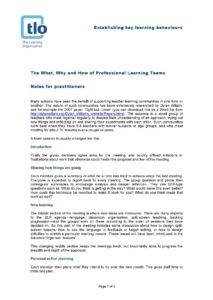[ If this is the team’s first meeting please read these guidelines beforehand]
The delicate, hard work of changing practice requires a safe professional environment in which to explore and understand both triumphs and tribulations. These short guidelines may be helpful in setting a climate for the team itself.
What-Why-How-of-PLT.pdfSession agenda
If this is the first team session it is important to spend the first part of the meeting considering the purpose and working guidelines of the team. Subsequent meeting agendas can drop item 2.
- Agreeing objectives and agenda (5 mins)
- Considering working practices (15 mins)
- Re-capping the on-line materials (15 mins)
- Deciding what’s to be done across the school (15 mins)
- Personal Action Planning (20 mins)
- Evaluating the meeting process (5 mins)
1. Session objectives: What do we want to achieve? (5 mins)
- Feel confident about working as a team
- Feel able to apply the on-line materials in the classroom
- Decide the strategic cultural issues that everyone needs to apply in their classroom
- Plan some do-able shifts in classroom practice
2. Consider the working practices of the team (15 mins)
- Purposes of the group
- Format of the sessions
- Ground rules for working
- Expectations of outcomes
3. Recapping on-line materials: What did we think of the materials? (15 mins)
Thoughts about:
- Your students as noticers
- Your classroom culture for noticing
- Ideas for activities and routines
- Suggested teacher talk.
4. Planning what to do across the school. (15 mins)
Decide
- Are there any ideas that we should all adopt as whole school strategies?
- Should such ideas be woven into school policies?
5. Personal action planning. What am I going to do? (20 mins)
Think about what you are trying to achieve.
Rather than simply deciding to introduce something new into the classroom because it sounds interesting, you will gain more value if the plan is given a specific focus by creating a question.
Why a question? Because this is an enquiry, you want to find out if something will change (pupil behaviour) when you change something specific.
Think through questions like:
- Where are your students now in their development of the learning behaviour?
- How you would like your students to be different?
- What aspects of your learning culture need to be improved/changed?
- Which of the practical ideas for doing something different seem most appropriate?
- How you want your pupils to improve/develop/enhance in …………?.
Think of it like this:
If I do XXXX will it improve/develop/enhance YYYY?
This is the crunch question. Students are unlikely to change unless your behaviour changes!
Visualise how you want your students to be and then think about what you might do, or say, or model, or celebrate, or whatever…. differently to bring about this change in students.
Developing-an-enquiry-question-Notice.pdfThe learning enquiry plan is a record of what you intend to do.
Taking your enquiry question on into a plan remember;
- you can adapt the activity/ideas that you chose to ensure they meet the needs of your pupils;
- make the plan specifically focus on development;
- concentrate on no more than three actions;.
- decide how to map your actions over the next three or four weeks;
- It’s useful to think about what you are going to do less of to make room for the changes.
The format below may help you think through the planning process. You can fill in your Personal Action Plan using the word document version.
Download MS Word version
As part of your plan it’s important to record what you will monitor over the weeks.
Changes you expect to see in your practice.
For example what do you expect to;
- hear yourself saying more often, with greater commitment, more effectively?
- look out for in order to find out which approach best suits most students?
- feel less stressed about? What will indicate that?
- monitor to make sure more meta-cognitive talk becomes established
Changes you expect to see in your students.
For example do you expect students to;
- talk more coherently about what they notice
- comment on sensory details and patterns
- show greater confidence in awareness of similarities and differences
- be moving to making links between what they notice
Noting such changes will motivate you to continue with their experiments because the changes in students are almost always positive.
The plan represents a promise to do it. This promise helps you to keep the plan as a priority in your mind.
6. Evaluate team session: How did we do as a team? (5 mins )
- Did we achieve our objectives?
- Are we comfortable with what we are trying to achieve?
- Any concerns at this point?
- Next meeting date and time.



Comments are closed.